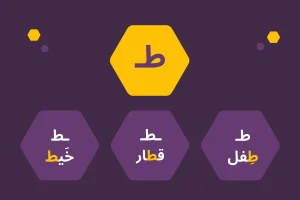
How Lessons from Polyglots can Help You learn Arabic Faster
Learning a new language can seem a difficult task especially when you start. Some languages are more difficult to acquire than others, and the Arabic Language might seem to be among the more challenging languages to learn.
But like any other language, language learners can use certain techniques to make their journey easier and their target of speaking the language more achievable.
In this blog, we have gathered 10 lessons from polyglots that will ensure you learn Arabic faster and get speaking in no time.
Who are Polyglots?
First, you might ask “Who are polyglots?” and “What’s different about how they learn a language?”
Polyglots have a good command of and can speak four or more languages. Another important feature of polyglots is that they usually learn languages as a hobby and because of a passion for learning languages.
What's polyglots’ secret to language learning?
Many polyglots have extensive experience in language learning languages, and they have developed their unique system for learning and improving their language.
Therefore, they are well-informed on how best to master any language quickly.
Moreover, as each language learner has a learning style that suits them, so is the case with polyglots. Each has found a way of learning that kept them motivated as they went on from one language to the other.
Unlike multilinguals, who often acquire languages through upbringing or practical necessity, polyglots pursue language learning primarily out of passion.
Since their main drive is a passion for languages, polyglots have developed their own methods of being in contact with the language. For example, some of them resort to extensive reading, while others recommend watching TV shows in the language you are learning.
We will explore methods and strategies polyglots find beneficial, contrasting these with traditional language learning approaches. We will specifically apply these polyglot strategies to learning Arabic, offering tailored advice for your language acquisition journey.
Tips from Polyglots
Learn chuncks of language
Many approach language learning by focusing solely on memorizing new words and expanding their vocabulary. However, this focus on isolated words often leads to quickly forgetting them. Therefore, it’s crucial to learn words in context or ‘chunks’. For instance, pair nouns with their commonly associated verbs to enhance retention. This method improves accuracy in both speech and writing by reinforcing contextual usage.
This tip will be helpful when learning Arabic nouns, verbs, and adjectives as they have different forms and usages. For example, when you learn the verb يكتب (to write), you should know it’s only used when the subject is singular and masculine and the action is in the present. Also, when you learn nouns like حرب (war), it is useful to learn it with common verbs and adjectives used with it. Check the following examples:
Word + Adjective
الكلمة + الصفة
Psychological warfare
Ḥarbun nafsīyah
حربٌ نفسية
Fierce war
Ḥarbun ḍarūs
حربٌ ضَروس
Cold war
Ḥarbun bāridah
حربٌ باردة
Street fighting
Ḥarbu Shawāriʻ
حربُ شوارع
Word + Adjective
الكلمة + الصفة
To avoid war
Ytjnnbu al-ḥarb
يتجنّبُ الحرب
To fight a war
Yshn ḥrban
يشن حربًا
To wage war
Ykhwḍ ḥrban
يخوض حربًا
To declare war
Yuʻlnu al-ḥarb
يُعلنُ الحرب
Customize your learning experience
In your language-learning journey, it’s essential to customize your experience to match your interests, goals, and preferred learning style. An important lesson from polyglots is their adoption of a customized plan.
For example, some start by mastering the most common 500 words in a language, which helps them begin speaking more quickly. Others immerse themselves in a blend of visual and audio content for extensive exposure. Meanwhile, traditional learners might lean towards textbooks. Choosing a method that you enjoy is crucial for maintaining motivation and committing to your plan until you achieve tangible results.
When beginning to learn Arabic, select the approach that most motivates you. Additionally, to prevent boredom, ensure you engage with a diverse range of resources, from videos and textbooks to learning apps.
Immerse yourself in the language
I once heard an interesting expression from a polyglot who said, “Bring the travel to you.” Traveling provides the perfect atmosphere for mastering a language, but even when traveling is not feasible, surrounding yourself with the language is your guaranteed way to master it.
Immersion is a powerful strategy in your language-learning adventure. It transforms your everyday environment into a dynamic classroom by integrating the target language into all aspects of your daily life.
Try listening to Arabic music, watching movies in Arabic, or following social media influencers who speak Arabic. Change the language settings on your devices and apps to Arabic. Try cooking recipes that require you to follow instructions in Arabic, or label household items with their names in Arabic. Engage in conversations with Arabic native speakers, whether through language exchange meetups or online platforms.
This continuous exposure to the Arabic Language ensures that your learning process is not only about memorization but also about understanding and living the language, making it a more enjoyable and effective journey. It also helps you overcome any fears or concerns that usually face people who start learning Arabic.
Work with an Arabic mentor
Alongside the wide variety of language resources you can have as a self-learner, having a mentor who is a native Arabic speaker can significantly enhance your language-learning journey. A mentor can provide immediate feedback, correct pronunciation errors, and explain complex grammatical structures in a way that is both understandable and relatable.
You can engage in regular sessions with your mentor, making sure you set objectives for each meeting that are tailored to your learning goals and interests. This objective could be mastering conversational phrases, understanding the nuances of dialects, or exploring the depths of Arabic literature. This approach ensures that you are not just passively absorbing information but actively engaging with the language.
Furthermore, a mentor can challenge you to step out of your comfort zone and practice speaking in real-life situations, from ordering food in a restaurant to having discussions on various topics. This real-time practice is invaluable, as it builds confidence and helps you to apply what you have learned in a practical context.
Read our blog about the benefits of having an Arabic Language mentor or coach here.
Focus on one language
It’s true that polyglots speak four or more languages, but many achieve this by focusing on only one language at a time. Learning more than one language simultaneously can make it difficult to make significant progress in any of them.
Since languages each have their own unique set of grammar rules, dedicating effort to one language at a time can yield better results. On the other hand, similarities between languages can cause confusion and negatively affect retention.
Moreover, like any other skill we learn in life, dividing your effort and concentration between two things will impact your performance in both.
Speak the language right away
Another lesson we learn from how polyglots learn languages is to start speaking the language immediately. This is often the most daunting step for language learners: beginning to speak.
Anxiety is a huge obstacle that prevents even confident speakers from speaking with assurance or considering themselves fluent.
Many polyglots have realized that overcoming this fear and beginning to speak the language you’re learning, even if only with a few basic expressions, is a great way to kickstart your journey to proficiency. This method boosts your confidence, helps maintain consistent learning, and protects you from the frustration that comes with delayed speaking.
Don't worry about making mistakes
Another key lesson from polyglots is not to fear making mistakes. Mistakes are a natural part of the learning process and essential for progress.
When you allow yourself to make mistakes, you create opportunities for correction and improvement, leading to a deeper understanding of the language. As an Arabic learner, you should embrace making mistakes as a natural stage that is an integral part of learning towards fluency.
Be patient and persistent
Learning a new language is a marathon, not a sprint. It requires patience and persistence. Progress might be slow at times, but consistency is key. Polyglots set realistic goals and celebrate small victories along the way. Every bit of effort counts, and over time, these efforts accumulate into significant achievements.
Learn from a language app
Technology can be a powerful ally in language learning. Language learning apps provide interactive and engaging ways to practice the language. These apps often include games, quizzes, and short lessons that fit easily into your daily routine. They can offer instant feedback and track your progress, helping to keep you motivated and informed about your development.
AlifBee is an Arabic learning app designed to boost your Arabic language learning journey, with a wide selection of exercises tailored to suit all skill levels.
The app also provides quick lessons prepared by our language experts and daily scenarios rich with Arabic culture. It features live statistics for easy and insightful progress tracking. You can download it here.
Make learning Arabic your daily habits
Learning a language takes time. It does not happen overnight. You might get discouraged on the way when you seem to need to make significant progress.
Polyglots incorporate small sessions of language learning or exposure to language daily.
To truly master Arabic, integrate it into your daily life. Set aside dedicated time each day for language study. Whether it’s reading Arabic newspapers, watching Arabic TV shows, listening to Arabic music, or practicing speaking with native speakers, consistent daily exposure will enhance your learning speed and comprehension.
Establishing a routine ensures steady engagement with the language, which is crucial for building and retaining your skills.
Final word
We hope you found these tips useful to your Arabic learning journey.
Make sure to download our learning app that will help you develop a consistent learning routine and achieve your Arabic learning goal.





